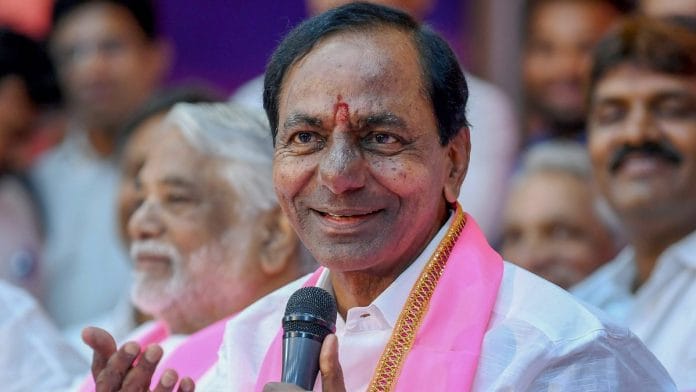K Chandrashekar Rao’s defeat at the Assembly elections in Telangana is a victory for rationalism. He tore down the historic Telangana Secretariat to build a vastu-compliant one and oversaw a massive Rs 1,200 crore revamp of the Yadagirigutta temple town. He worshipped at the altar of superstition, but his faith in astrology, numerology and vastu could not guarantee him a victory. Delivering on promises and good governance would have done the trick.
It’s made him vulnerable to political jibes from his opponents, with even Prime Minister Narendra Modi taking a dig at his “superstitious beliefs”.
“KCR is a slave of superstition’ and as a result, had the Secretariat demolished,” Modi had said last month in the run-up to the assembly elections. “His superstitions are such that someone whispered in his ear, ‘If Modi’s shadow falls on you, then all your dreams will be destroyed’. Since that day, he has stayed 50 feet away from me, and hasn’t come to the airport to meet me.”
No amount of vastu compliance, demolitions of historic structures, and timing speeches to the T so they could fit mahurat (auspicious time), could guarantee a mandate for KCR. Turns out, the results would not have magically changed had they been declared on the 5th of December instead of the 3rd. KCR still would’ve lost.
Destroying ‘bad omens’
Superstitions can be pervasive in politics. Swearing-in and oath-taking ceremonies are often held on ‘auspicious’ days, after all. But it’s rare for a leader to be so trapped by them that it affects the way he runs his state.
KCR reportedly didn’t go to the Telangana assembly for six years because the building was not vastu compliant.
The story goes that the G Block of the previous secretariat – once shared by the Andhra Pradesh and Telangana governments – is cursed. Popularly known as the ‘Saifabad curse’, the building was made in 1888 by Nizam VI Vir Mahboob Ali Khan Bahadur.
When Mahboob Ali was on his way to inspect the palace, two nobles who wanted to end his reign ensured that monitor lizards – considered bad omens – crossed his path. Ali quickly sealed the building, which was opened later in the 1940s to house the state secretariats for the Nizam dominions.
As India gained independence, the state of Hyderabad fell. KCR considered the building unlucky and reportedly never worked from there. Instead, he built a grand office at his residence to work out of.
Subsequently and in the thick of the Covid-19 pandemic, KCR decided to demolish the structure and build a new one. Media, of course, wasn’t allowed to cover the event (politicians do consider the media a bad omen). Soon, a vastu-compliant replacement was erected at the cost of Rs 860 crore. Such shameless grandeur wouldn’t go down well with the electorate.
Superstition isn’t an alien concept in India. Like KCR, many in his electorate must be obsessed with vastu compliance themselves. Except EVM buttons are not pressed keeping in mind the vastu shastra of the day.
Many will consider this point counter-productive, since, in the recent Modi years, state and religion have been holding hands in public. Even the ISRO team behind Chandrayaan-3 visited a temple before its launch. But some would argue that religion and superstition are not the same. Most Indians would draw the line somewhere.
Also read: India has a big problem of public loudspeakers. It has even entered my bedroom now
Love for six
KCR not going to a secretariat for six years is just the tip of the iceberg.
His affection for the number six is also widely known. In 2014, when he first took oath as chief minister, he is said to have timed his speech down to the last second to ensure it was concluded dot at 12:57 PM. When you add one, two, five and seven, the total is 15. And five + one is six.
The number plates of KCR’s cars also add up to six, and he has even ensured that six members of his immediate family participate in active politics.
Six even guided the number of people he put into different committees. The Coordination Committee on Farmers had 15 members, the Bharat Rashtra Samithi (BRS) district committee had 24 members and state-level committees had 42 members. All digits in these numbers round up to a total of six.
If everyday government functioning is affected so badly by a person’s superstitious beliefs, how will his constituents take him seriously?
There’s a story of Napoleon Bonaparte visiting a famous palm reader who told him that he’ll never be king because he didn’t have a ‘fate line’. Napoleon reportedly cut the lines on his palm to write his own destiny. KCR would have benefited from this story, perhaps.
If superstitions must be addressed, the conversation should focus not on which numerical calculations went awry, but on the extent to which these beliefs obscured sound governmental decision-making.
(Edited by Zoya Bhatti)






